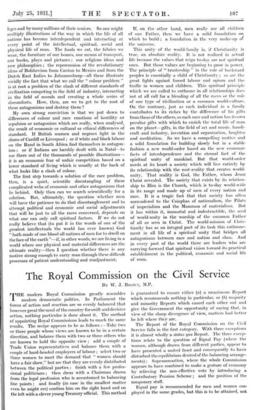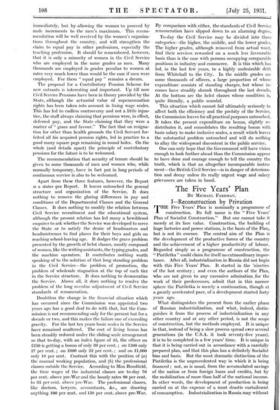The Royal Commission on the Civil Service By W. J.
BROI‘•N, M.P.
THE modern Royal Commission greatly resembles modern democratic politics. In Parliament the forces of action and reaction are so evenly balanced that however great the need of the country for swift and decisive action, nothing particular is done about it. The method of appointing Royal Commissions leads to much the same results. The recipe appears to be as follows :—Take two or three people whose views are known to be in a certain directito, and balance them with two or three others who are known to hold the opposite view ; add a couple of Trade Union representatives and balance them with a couple of hard-headed employers of labour ; select two or three women to meet the demand that " women should have a fair show," but see that they are evenly distributed between the political parties ; finish with a few profes- sional politicians ; then dress with a Chairman drawn from the legal profession who is accustomed to balancing fine points ; and finally (in case in the smallest matter even he might err) confirm him on the right hand and on the left with a clever young Treasury official. This method is guaranteed to ensure either (a) a unanimous Report which recommends nothing in particular, or (b) majority and minority Reports which cancel each other out and give the Government the opportunity of saying that, in view of the sharp divergence of view, matters had better be left where they are.
The Report of the Royal Commission on the Civil Service falls in the first category. With three exceptions it is almost wholly a status quo Report. The three excep- tions relate to the question of Equal Pay (where the women, although drawn from different parties, appear to have presented a united front and consequently to have disturbed the equilibrium desired of the balancing arrange- ments) ; Superannuation, where the whole Commission appears to have combined to make a gesture of economy by relieving the non-effective vote by introducing a Contributory Pension Scheme ; and the position of the temporary staff.
Equal pay is recommended for men and women em- ployed in the same grades, but this is to be attained, not immediately, but, by allowing the women to proceed by male increments to the men's maximum. This recom- mendation will be well received by the women's organiza- tions throughout the country, and will strengthen the claim to equal pay in other professions, especially the teaching profession. It should be remembered, however, that it is only a minority of women in the Civil Service who are employed in the same grades as men. Many thousands are employed in grades peculiar to women at rates very much lower than would be the case if men were employed. For them " equal pay " remains a dream.
The proposal for a Contributory Pension Scheme for new entrants is interesting and important. Up till now Civil Service Pensions have been in theory provided by the State, although the actuarial value of superannuation rights has been taken into account in fixing wage scales. This has led to endless controversy and not a little injus- tice, the staff always claiming that pensions were, in effect, deferred pay, and the State claiming that they were a matter of " grace and favour." The fact that on resigna- tion for other than health grounds the Civil Servant for- feited all his acquired pension rights, led in practice to a good many square pegs remaining in round holes. On the whole (and details apart) the principle of contributory pensions for the future is to be welcomed.
The recommendation that security of tenure should be given to some thousands of men and women who, while normally temporary, have in fact put in long periods of continuous service is also to be welcomed.
Apart from these three features, however, the Report is a status quo Report. It leaves untouched the general structure and organization of the Service. It does nothing to remove the glaring differences in pay and conditions of the Departmental Classes and the General Classes. It does nothing to modify the relation between Civil Service recruitment and the educational system, although the present relation has led many a bewildered enquirer to ask whether the Service was developed to serve the State or to satisfy the desire of headmasters and headmistresses to find places for their boys and girls on reaching school-leaving age. It dodges the grave problem presented by the growth of helot classes, mostly composed of women, like the writing assistants, the typing grades, and the machine operators. It contributes nothing worth speaking of to the solution of that long standing problem in the Civil Service—the problem of promotion, the problem of wholeiale stagnation at the top of each tier in the Service structure. It does nothing to democratize the Service. Above all, it does nothing to resolve the problem of the long overdue adjustment of Civil Service standards of remuneration.
Doubtless the change in the financial situation which has occurred since the Commission was appointed two years ago has a good deal to do with that, but the Com- mission is not recommending only for the present but fora decade or two, and this makes the failure one of exceeding gravity. For the last ten years basic scales in the Service have remained unaltered. The cost of living bonus has been steadily reduced under the sliding scale arrangement so that to-day, with an index figure of 45, the officer on £250 is getting a bonus of only 33 per cent. ; on £500 only 27 per cent. ; on £800 only 22 per cent. ; and on £1,000 only 18 per cent. Contrast this with the position of (a) the manual working population, and (b) the professional classes outside the Service. According to Miss Bondfield, the time wages of the industrial classes are to-day 70 per cent. above pre-War and the hourly rates 90 per cent.
to 95 per cent. above pre-War. The professional classes, like doctors, lawyers, accountants, &c., are drawing anything 100 per cent. and 150 per cent. above pre-War. By comparison with either, the standards of Civil Service remuneration have slipped down to an alarming degree.
To-day the Civil Service may be divided into three categories—the higher, the middle, and the lower grades. The higher grades, although removed from actual want, find their services rewarded on a much less favourable basis than is the case with persons occupying comparable positions in industry and commerce. It is this which. has led, in the last few years, to a highly undesirable drift from Whitehall to the City. In the middle grades are some thousands of officers, a large proportion of whose expenditure consists of standing charges, but whose in- comes have steadily shrunk throughout the last decade. At the bottom are the helot classes whose condition is, • quite literally, a public scandal.
This situation which cannot fail ultimately seriously to affect both the efficiency and the probity of the Service, the Commission leaves for all practical purposes untouched. It takes the present expenditure on bonus, slightly re- distributes it, and consolidates the resulting bonus with basic salary to make inclusive scales, a result which leaves the substantial problem untouched and will do nothing to allay the widespread discontent in the public service.
One can only hope that the Government.will have vision enough to look further ahead than the Commission appear to have done and courage enough to tell the country the truth, which is that an altogether incomparable instru- ment—the British Civil Service—is in danger of deteriora- tion and decay unless its really urgent wage and salary grievances are taken in hand.











































 Previous page
Previous page